Should there be a recommended daily intake of microbes?
That is what a bunch of scientists were asking themselves (5). We have dietary recommendations for fiber, why not for microbes? Truth is, they are probably merely front-running the future dietary recommendations of 2050. Because, yes, microbes matter.
Are you eating sufficient microbes? Probably not. Industrial foods are lower in microbe diversity due to standardization of strains and methods (pasteurization, homogenous domesticated yeasts) as compared with traditional foods; raw milk products, wild wine and beer, kefir,... Industrial fruits and vegetables carry lower phytochemical counts as compared to their wild variants, resulting in lower polyphenolic dietary intakes and this could be expected to negatively influence normal bacterial lactic acid growth in humans. This effect is part of what is themed "domestication syndrome" (6) in the literature.
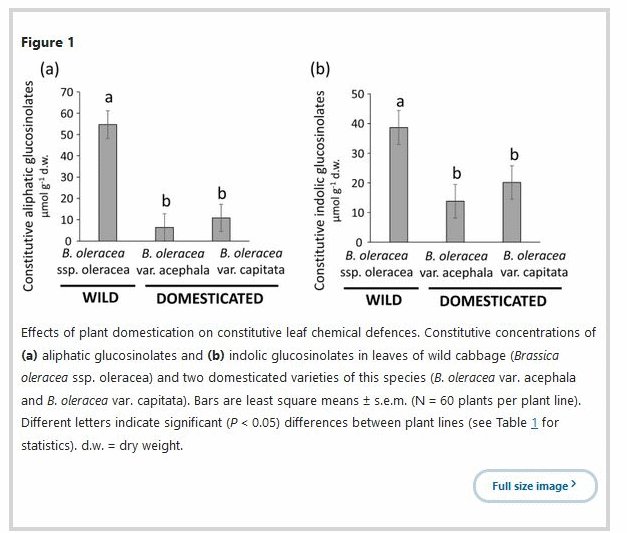
Plants might not have lost much nutrition over time, but they did lose substantial amounts of phytochemicals as compared to their wild cousins. Paying special attention to creating a diet high in phytochemicals is warranted, all it might be doing is bringing us back to normal levels. Carotenoids were found to be 50% lower in domesticated legume variants, with some subtypes even completely missing. I think it's fair to say that modern humans are thus also suffering from a "nutritional domestication syndrome" even though we're eating a diet that is high in fiber and plant-based material. Why is this relevant to microbe count? In addition to other properties, it is the subset of phytochemicals in a plant species that decides which microbes are present in the food.
In mammals, in addition to geography, diet diversity decides microbiome richness. Take for example the vegetarian species woodrats, their microbiome increases linearly as the number of different plant families in the diet increases. This should be a recurrent theme by now, we’ve seen in BioSUIT Needs Fiber, that each type of plant comes with its own type of unique fibers. As we can learn here, their consumption also comes with their own types of microbes. The BioSUIT DIET will have an entire algorithm dedicated to increasing the botanical diversity of the plant species present in the diet.
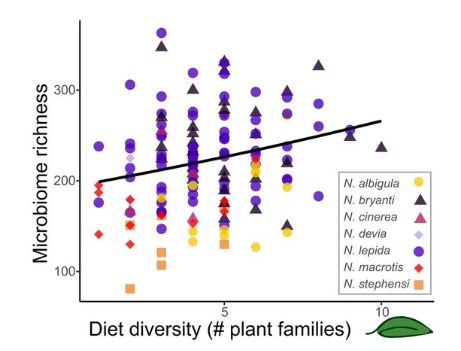
In humans too, using more kinds of herbs (2) increases microbiome richness.
For a biohacking protocol heavily based on evolutionary biology, it should come as no surprise to you that the BioSUIT DIET can’t possibly exclude any foods or food groups that have been historically consumed by humans and their predecessors. Diet diversity in the sense of food group inclusiveness (yes, there’s a non-woke origin of this word), also raises the chance for nutrient adequacy across the board (1).
Evolutionary biology: Why bother with probiotics?
In 2019, Aaron Lerner writes about probiotics and how microorganisms predate humans and certainly their human probiotics, which most probably originate from fairly recently during the Neolithic layer of the Stone Age period, some 10,000 years ago.
Some arguments could be made from Aaron's critique
-
Probiotics are a recent human invention and thus artificial in light of human/microbial evolution
-
We know too little about the microbiome to know what's right and the original microbiome is already gone
The first argument is based on a limited understanding of how fundamental microorganisms were during human evolution and that of many other species. Many primates consume fermented foods (FFs), and carnivorous mammals too, have been reported to store and ferment foods by burying them or submerging them in water (3). Yet humans and our ancestors are particularly inclined towards FFs, and we have acquired physiological adaptations for them (Breslin, 2013).
*- ADH4 enzyme 40x more efficient at digesting ethanol
*- HCA signaling system that is agnostic towards lactic acid bacteria and byproducts highly present in fermented foods (inherited as primates but even more predominant in humans), regulating our energy and immunity status
*- In contrast to other mammals, sour taste is perceived as being pleasant in humans
Aaron relies heavily on what is left of the archeological record and equates agriculture to fermented food, but FFs were eaten by our ancestors even before we split from the apes as is dictated by our genome. Neanderthals and H. erectus probably already created FFs (Speth, '‘17). Adaptations for fermented food consumption that emerged in the last common ancestor (LCA) of humans and African apes facilitated the use of fermentation as a predigestion strategy for Australopithecus in nutritionally challenging landscapes.
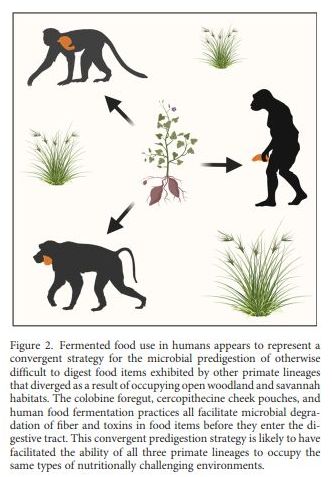
Neither should we fail to grasp that fermentation should not be seen as a human “activity”, it is merely a microorganismal function, one that is rampant in the natural world. For example, all tropical fruits that would have served as food to our primate ancestors would have been naturally fermented, merely by growing in the environment of the jungle. In a sense, fermented food was previously known as “food”. One could argue that the controlled addition of LAB to milk by the first agricultural Europeans was merely the domestication of LAB, certainly not their introduction to the human (primate) diet.
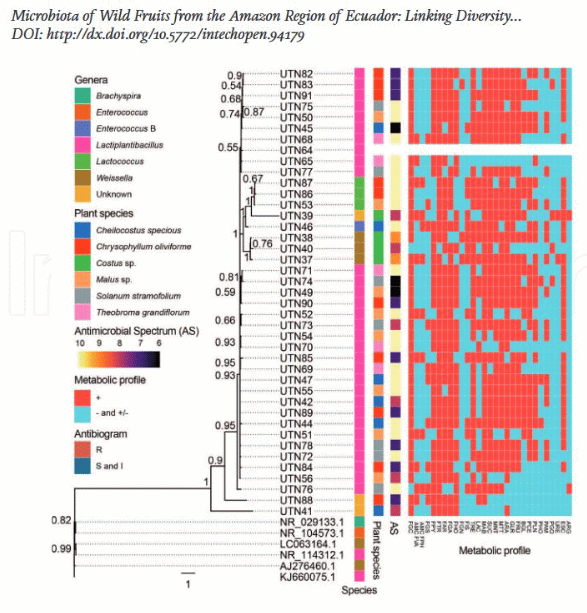
Lactic acid bacteria (LAB) are almost always seen in the light of milk and dairy consumption, but these bacteria were with us long before. They are present in natural plant foods (which are always semi-fermented), thus not only in fermented dairy. So whatever the food carrier may be, it's important to get those LAB bacteria into your diet. Whether through organic whole foods, fermented plant foods, or fermented dairy. Milk has a pH below neutral, so even without fermenting it with bacteria, it would naturally contain them.
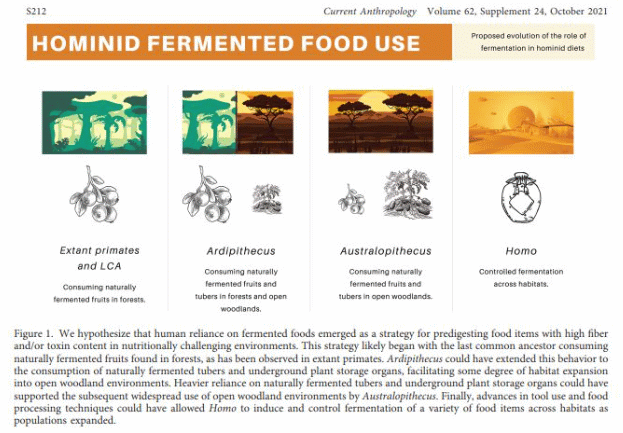
Now let’s tackle Aaron’s second argument, that the optimal microbiome is unknown, and the original human microbes are probably already gone. Ideas like building a doomsday vault for bacteria are based on the same premise. Such a microbe vault could go search for specific microbes that evolved alongside humans in hunter-gatherer populations, but most research comparing the microbiome of our ancestors seems to suggest that these “original” bacteria strains are no longer to be found in modern humans.
Instead of searching for some primeval set of human-centric microbial strains though, I would propose something different. Seeing the ever-changing geography and diet diversity of our species, it would seem unlikely that there’s a specific set of strains of bacteria that evolved along our side. But in general, they are still with us as groups of bacteria, for example, lactic acid bacteria. Furthermore, some would say, it's the song, not the singer. Evolutionary biologist Ford Doolittle; "Compelling about holobionts like us, is stable networks of interaction patterns among disparate lineages without ascribing a special evolutionary identity to them."
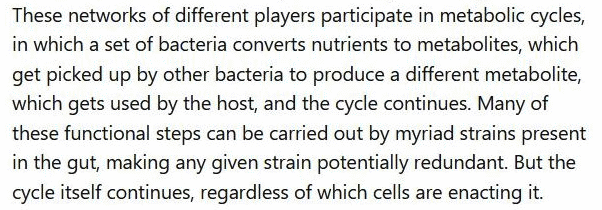
Gut microbiomes contain a wide diversity of species & strains but exhibit remarkable conservation of core functions performed by these organisms. So what seems to count here, is that the microbiome always has the same biological tasks, yet the species that carry out the tasks can differ, making all of them, in theory, redundant or replaceable. What we are left with for the protocol from this is to propose to increase microbial numbers, not hunt for any perfect one.
That is not to say that specific strains cannot be beneficial in the future (supplements are too dangerous for now, see previous thread). However, increasing the microbial load and diversity would overall lead to the same effects. The best way to do this is by adding traditional fermented foods.
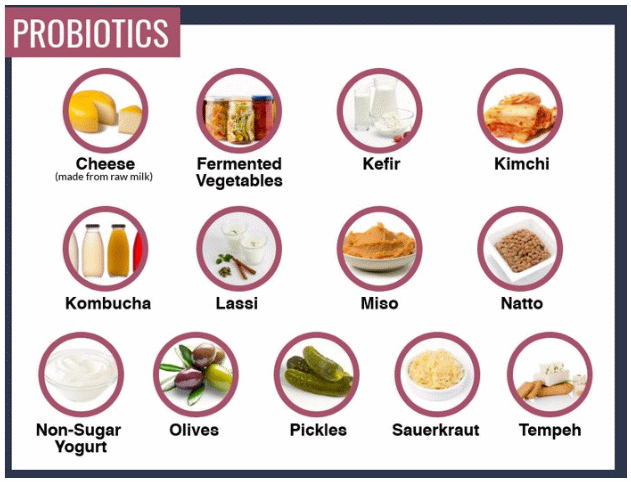
Fermented animal products
Some meats like prosciutto and salami are fermented, and their native microbes will populate the gut after consumption.
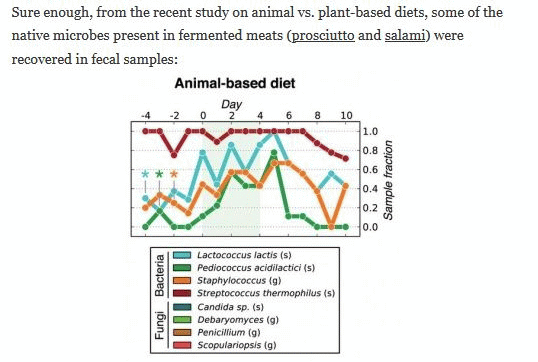
Some cuts are either very lean (like Bresaola, a type of air-dried, salted beef that is aged for several months) or there are cuts of superb quality like Iberian Ham, that come from pigs finished off with acorns resulting in high Omega 3 meat which prevents the SFAT damage normally associated with processed meats. These are mostly high in salt too, which shouldn’t be a real issue if you count this into your daily salt intake AND if you drink a high volume of water directly after their consumption to prevent damaging the endothelium. But these high-salt foods might still be lowering your immune system’s defenses through altered white blood cell function. If there’s a latent infection, this might be sufficient for you to catch that cold after all. So moderate your intake.
Polycyclic aromatic hydrocarbons are created during high heat processing of processed meats, but you can choose fermented meats that are dried by exposure to regular air and thus do not contain these compounds.
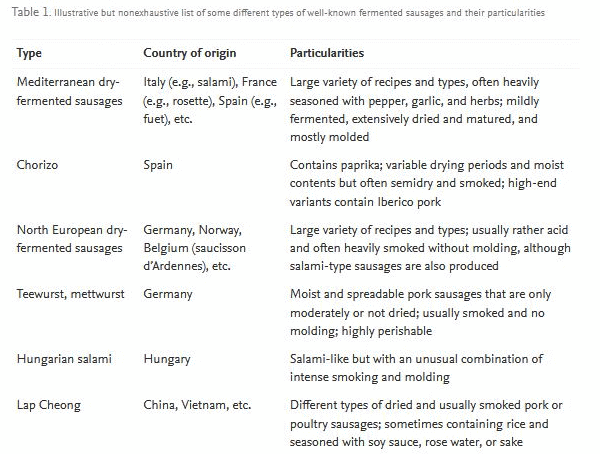
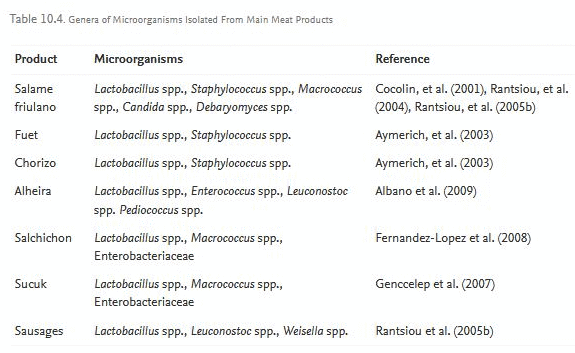
Additionally, the formation of N-nitroso compounds from the nitrate that is added to processed meats to prevent spoilage is another issue. If the product has no ascorbic acid or vitamin C added to it by the manufacturer, you should in theory add your vitamin C during the consumption of the processed meat to offset the formation of these compounds. But why go through all of this hassle, just to be able to consume processed meats though? Well, maybe it’s a little for the hedonistic experience, but I also like to add at least some of these for their exceptionally high microbial count. One could argue whether this is a good idea though, when the immune system boost from the probiotics from these foods gets nullified by the high salt injection. Something like fermented meat does come with bioactive peptides that have antioxidant functions (6).
Bresaola is a fermented food. While not limited to one probiotic strain of yeast or bacteria, F. De Filippis (2020) reported that fermented meat is the greatest probiotic source for lactobacillus species, even trumping dairy probiotic foods like Kefir.
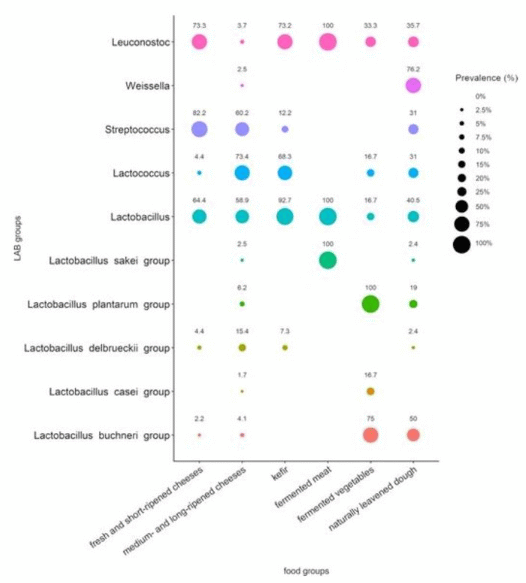
In addition, Bresaola could be regarded as a good source of polyamines, bioactive peptide compounds implicated in longevity that protect cells, regulate antioxidant systems, and reduce oxidative stress. While Bresaola is one if not the best source of dietary protein levels due to its leanness, it can also serve as "a supplement” with biologically important non-essential amino acids, something we will discuss in the protocol later in a chapter about protein and amino acids. Bresaola can also be used to enhance sports performance when you do salt loading.
Hard evidence on probiotics
A 2021 study (4) was the first scientific "hard evidence" for fermented foods to improve human health (lower inflammation). Before 2021, writing about FFs could be categorized firmly into the “alternative health” section. Fermented foods have always been a tough nut to crack for dieticians because they're the odd one out. They're inevitably products of "controlled rotting", there were few human RCTs for any health claims, and they often contain undesirable ingredients like salt or oil. Furthermore, being historical food conservation methods, few food experts see/saw any link between jars of sauerkraut and how or why they would offer any benefit to an otherwise healthy diet, in other words, they're not seen as natural dietary components to human nutrition. (They’re not evolutionary biologists after all).
But now, not anymore. It was yet unknown whether these benefits (4) were in addition to what could be gained on a healthy fiber-rich diet though. Because, one could argue that merely eating a fiber-rich diet would be more than enough to have a rich microbiome, the more fiber we consume, the more microbes we need to metabolize them. For example, this was an argument made against the need to consume any FFs from Doctor Michael Greger. However a follow-up study after 2021 compared an FFs diet to a high-fiber + FFs diet, and it seems like it beats out the high-fiber diet. It’s worthwhile to add FFs to an already healthy diet.
Most people, think or thought that consuming foods rich in microbes would increase their microbial diversity. But the same research that has proven health benefits from FFs has also shown that these living organisms, fail to permanently populate the gut after consuming these foods. The fiber does (prebiotics), but the probiotics don’t. The health benefits from microbes from FFs don’t seem to rely on them turning into permanent residents, they are more like a “mobile microbiome crew” passing through and having various known health effects along the way.
In his book, biologist Rob Dunn from a Department of Biology opines that while "clean living" has benefited us in some ways, it has also made us sicker in others. We are trapped in bodies that evolved to deal with the dependable presence of hundreds of other species.
Warning against probiotic supplements
In 2008, some probiotic supplements raised patient mortality during an RCT on pancreatitis patients, and the researchers remarked that "probiotics can no longer be considered safe".
Also, we shouldn't insert them into our butt or directly into our intestines, like in the pancreatitis study... Not taking supplements includes the "advanced" stuff like Ecologic® the one given in the RCT, until people started dying... The science is not there yet... At all.
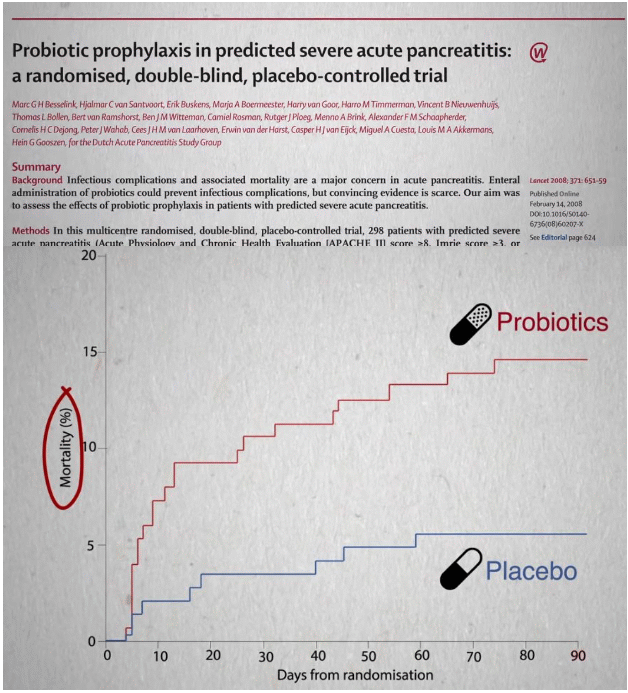
The FDA considers probiotics (supplements) GRAS, and the EFSA considers it something similar but has rejected specific health claims except for helping with lactose intolerance.
SOURCES
(1) Gómez, G., Nogueira Previdelli, Á., Fisberg, R. M., Kovalskys, I., Fisberg, M., Herrera-Cuenca, M., ... & Brenes, J. C. (2020). Dietary diversity and micronutrients adequacy in women of childbearing age: results from ELANS study. Nutrients, 12(7), 1994.
(2) Vita, A. A., McClure, R., Farris, Y., Danczak, R., Gundersen, A., Zwickey, H., & Bradley, R. (2022). Associations between Frequency of Culinary Herb Use and Gut Microbiota. Nutrients, 14(9), 1981.
(3) Amato, K. R., Mallott, E. K., D’Almeida Maia, P., & Savo Sardaro, M. L. (2021). Predigestion as an evolutionary impetus for human use of fermented food. Current Anthropology, 62(S24), S207-S219.
(4) Wastyk, H. C., Fragiadakis, G. K., Perelman, D., Dahan, D., Merrill, B. D., Feiqiao, B. Y., ... & Sonnenburg, J. L. (2021). Gut-microbiota-targeted diets modulate human immune status. Cell, 184(16), 4137-4153.
(5) Marco, M. L., Hill, C., Hutkins, R., Slavin, J., Tancredi, D. J., Merenstein, D., & Sanders, M. E. (2020). Should there be a recommended daily intake of microbes?. The Journal of nutrition, 150(12), 3061-3067.
(6) Moreira, X., Abdala-Roberts, L., Gols, R., & Francisco, M. (2018). Plant domestication decreases both constitutive and induced chemical defences by direct selection against defensive traits. Scientific reports, 8(1), 12678.
(7) Ferranti, P., Nitride, C., Nicolai, M. A., Mamone, G., Picariello, G., Bordoni, A., ... & Capozzi, F. (2014). In vitro digestion of Bresaola proteins and release of potential bioactive peptides. Food Research International, 63, 157-169.